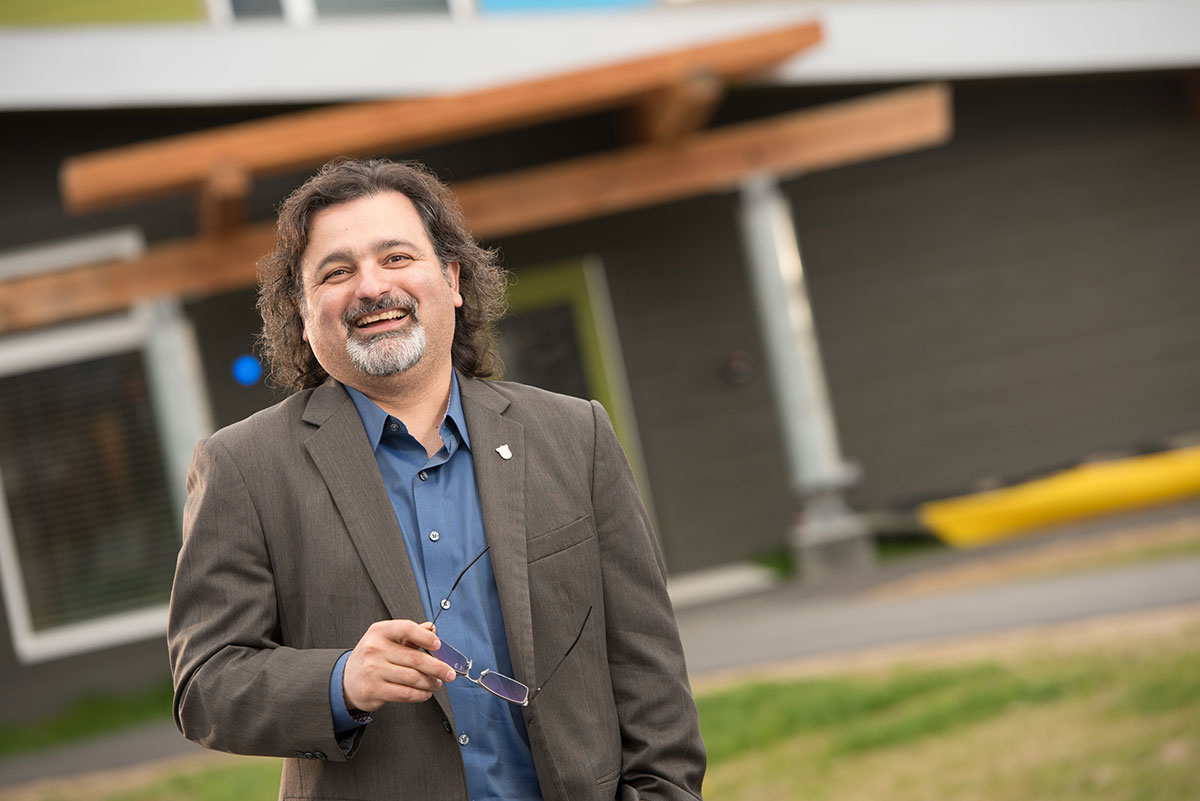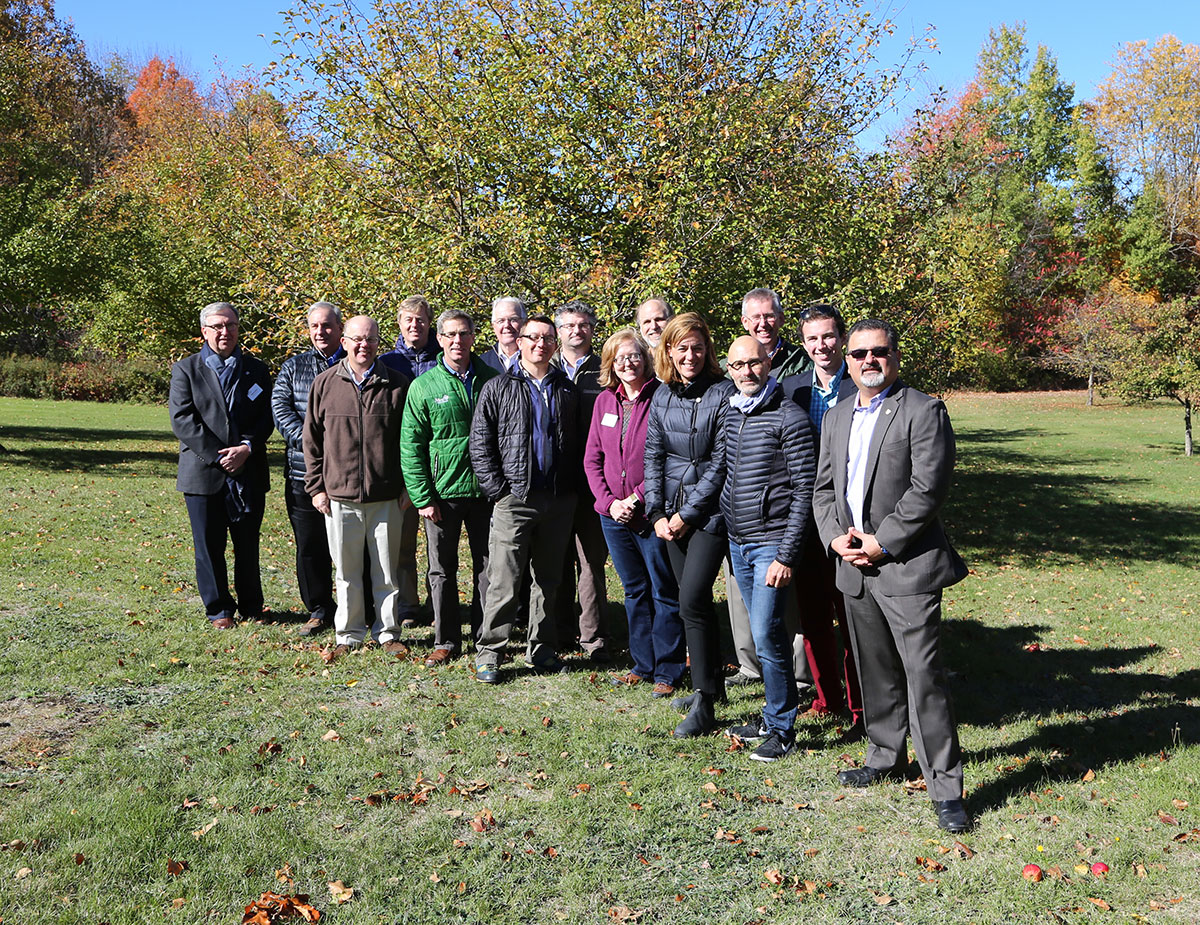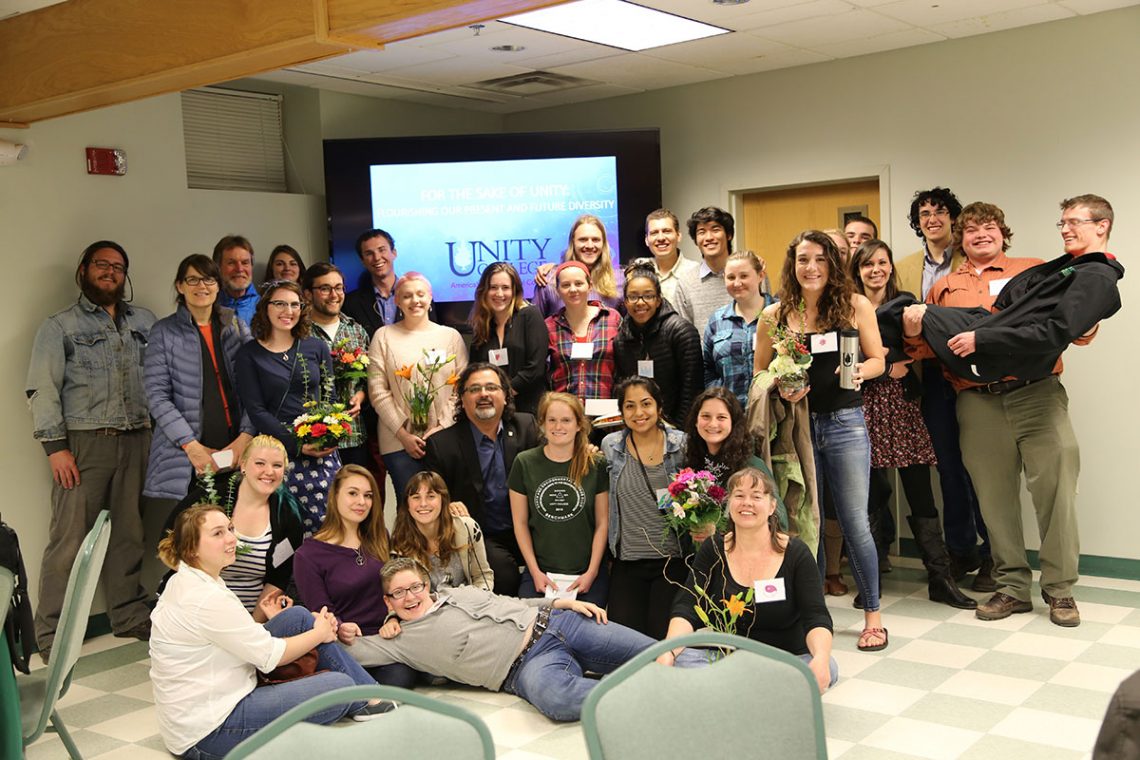One morning in September, Unity College President Dr. Melik Peter Khoury was speaking to a private foundation about reinventing the college experience.
Later that day, we found him serving up burgers at Wyman Commons. “Local beef or veggie?” he says to a student in line. “After that soccer game yesterday, it’s no wonder you’re hungry.” The student smiles, “Hi Melik. Beef please.”
The evening found Dr. Khoury working through a particularly thorny budget issue with one of Unity’s chief officers.
Asked about his day, Dr. Khoury responded with a signature grin, “Doesn’t every president live like this?”
As comfortable in the boardroom as he is in the woodlot, Dr. Khoury mixes with Unity’s future game wardens as comfortably as with future marine biologists.
But the way he sees it, he is neither “hunter” nor “hugger.” Or maybe both. Being the 11th president of Unity College at the dawn of the environmental century — and amid changing times in higher education — demands that Dr. Khoury embrace an array of diverse viewpoints and new thinking about the role of higher education in today’s fragile world.
“I view my presidency not as the culmination of my life’s work but actually as the beginning of it,” he said. “It disheartens me when I see colleagues at other colleges who view the president as a figurehead who should stay out of any real innovation or impact. So part of what I’m trying to do is change the image of what a president should be.”

“Changing Higher Education” is the latest in the award-winning video series focused on Unity College. Dr. Khoury’s passion for higher education is highlighted.
A world away
Khoury grew up working in his family’s restaurant in a small coastal town in west Africa, where the effects of environmental degradation were widespread.
At the time, “I didn’t understand there was even a career opportunity in sustainability,” he said in his address at a networking event in September. “I grew up in a world where we didn’t realize that all the decisions we were making — from trading in commodities, trading in food, how we did business — could negatively affect the only planet we have.”
In retrospect he realizes that he was learning the tenets of sustainability in a way most of the world understands out of necessity.
“It’s amazing how many small communities across the world are actually practicing sustainability without understanding the theory behind it. Due to the lack of industrialization, my father and I used to go to the coast in the morning and buy the fish right from off the boat. We would go to the local gardener to purchase produce. We did things as a middle-class African family that is mostly enjoyed by the upper-middle class in America.
After his work in the family restaurant and prior to dedicating himself to academia, Khoury was an international business executive, serving as a Director of Euro-Gambian Trading. He then went on to attend college in the U.S., obtaining his Baccalaureate from the University of Maine at Fort Kent, a Master of Business Administration from the University of Maine, and a Doctorate in Business Administration from the University of Phoenix.
During his career in higher education, Khoury earned a series of senior roles in strategy, innovation, academics, enrollment, finances, development, and marketing at small private colleges throughout the U.S., including Paul Smith’s College, Culver Stockton College, Upper Iowa University, and Unity College.
What he saw was that small, private higher education was under immense pressure — financially, academically, and socially — to produce graduates who have relevant training in the sustainability sciences, prospects for using these skills to improve society, and a manageable debt load.
“As a first-generation American, I grew up understanding that education was the way up. I understand many people see education as a right, but I saw it as a privilege,” Khoury said. “When I came to the States, and saw education slipping away little by little in its importance and its relevancy, it really affected me. I know much of the world would do anything to have the rights we have, to have our opportunities in education, and to have it in a way that ensures future generations will enjoy the kind of life we have today.”

Board of Trustees In August, the Unity College Board of Trustees voted to make Dr. Khoury Unity’s 11th President.
Lofty goals, early wins
Khoury began serving as president in an interim role beginning Jan. 3. At the time, he had been serving as Executive Vice President and Chief Academic Officer. But he had served in progressively broader leadership roles since arriving at Unity College in early 2013: first, as Senior Vice President for External Affairs, then Executive Vice President & Chief Financial Officer. In 2015, Khoury added Chief Academic Officer to his responsibilities.
On Aug. 12, the Unity College Board of Trustees voted unanimously to appoint him the 11th sitting permanent president of Unity College.
Board of Trustees Chairman John Newlin cited Khoury’s leadership results and bold vision as key factors in the appointment.
“We set some very high expectations for Dr. Khoury,” Newlin said. “The truth is, Melik and the team he has assembled have met and significantly exceeded those lofty goals. Three straight years of record enrollment, significant increases in revenue and budget, and consistent faculty and staff raises – proof points like these make Unity the envy of other small, private colleges in an era when small colleges are closing at an alarming rate.”
From other corners of college leadership came similar praise.
“I have been overwhelmingly impressed,” said Chuck Johnson ‘73, a newly appointed member of the Board of Trustees. “Dr. Khoury blends a powerful vision for liberal arts education with the business acumen necessary to realize it. Getting a long-term commitment from Dr. Khoury was very important to the Board of Trustees.”
“The Unity College faculty are education innovators committed to helping students achieve their academic and personal goals,” said William Hafford, Psy.D. ’08. “Dr. Khoury’s appointment and long-term commitment mean that faculty will have an educational partner for years to come.”
“Melik has been a student favorite since he came to Unity,” said Gunnar Norback ‘17, Unity College Student Government President. “Whether students are playing soccer, making presentations at the Student Conference, or eating in the cafeteria, Melik joins in and always wants to know what students are thinking and how they’re doing.”
Now finishing his first year as president, Khoury has plenty to celebrate: record-breaking enrollment, up 10% year over year amid a declining national enrollment picture; the rollout of Unity’s first-ever graduate degree, the first the college has ever offered completely online; the acquisition of McKay Farm & Research Station as a key piece of the college’s sustainable agriculture curricula (see sidebar); and more.
In April, Maine’s largest daily newspaper honored the college with its Source sustainability award as a business or nonprofit “that has been steadily building the infrastructure, community connections, or other resources necessary to make Maine a more sustainable place to live.”
In October, MaineBiz, the state’s top business publication, named Khoury to its NEXT List honoring “the 10 people who will influence the future of Maine’s economy.” The juried list “honors business savvy individuals, nominated by their peers and colleagues, who are true entrepreneurs, forward-thinking leaders, and positive motivators for change.”
“Based on the growth of Unity College, both in its enrollment and the physical growth of its campus, along with steps you’ve taken to free the campus of fossil fuel dependence and other factors, the selection committee was unanimous in its decision,” MaineBiz Editor Peter VanAllen wrote in his award letter to Khoury.
But in the environmental century, “celebrate” is not a word the president uses frequently, especially when talking about one of his key long-term initiatives: diversity.
“Diversity has been misunderstood,” he said, “as a one-time event where we celebrate a culture, or a group, or an ethnic or religious identity. Diversity is really not about celebration; it’s about understanding other people’s perspectives. And it’s key to unlocking solutions to some very complex environmental problems that, all too frequently, are only being looked at through a single lens.”
The key to diversity
Diversity of genetic stock is a key factor in the successful adaptation of any species. This is true for institutions and worldviews as well as for organisms. When talking about diversity, the president sometimes uses himself as an example of how multiple nonpartisan perspectives are required to arrive at lasting solutions.
Whether the discussion is college affordability, the relevance of a residential liberal arts education, or the very challenge of global environmental survival, it’s clear to Khoury “diversity” means more than bringing one’s own personal identity to the table.
“You don’t have to agree with a perspective to understand it,” he said. “But I think we are almost afraid to understand a perspective because we may agree with it.
“I think I bring a perspective that other people don’t understand. Whether it’s a competitive advantage or burden, I don’t know. But I get to see things from multiple perspectives, which makes it very confusing for people who tend to mainly see the world through their own lens. So decision making has to be intertwined and integrated with the other perspectives in order to come up with something better.”
In a world where multiculturalism is key to understanding change, Khoury says diversity is “not about checking boxes. It’s not ethnicity, nationality, religion, culture, or politics. It is all of those things. And none of these are clear boxes.”
Khoury wants Unity College graduates “to be resilient enough to be able to survive in a complex world. You can’t isolate if you want to save the planet,” he said.
Which is why Khoury is making the rounds among a diverse array of potential partners. From leading Maine corporations, to foundations, to high school educators innovating their curricula, to political leaders on both sides of the aisle, his schedule has been chock full of what he calls his “Unity Tour.”
“We are reaching out to share what we know about the environment and inviting conversation about finding common ground, creating positive change, and managing scarce resources for future generations; and that discussion is evolving every day. We want to talk about how Unity College will partner with anyone interested in a sustainable future that aligns with sound, ethical business practices and profits.
“I’ve been inviting individuals and organizations to partner with Unity College and to reimagine sustainability and higher education for a post-partisan era,” he said. “Some are taken aback by the boldness of our vision; most seem to find it refreshing.”
“I want to shift the conversation from the notion of donations into the mode of investment. Investment in research, investment in product development, investment in problem solving. What if these big organizations like L.L. Bean and New Balance or a person like Elon Musk came to Unity College and created a center that allowed students to do research and faculty to teach?”
From the largest corporations to the smallest nonprofits, he said: “We want to be inside shaking hands, not outside shaking fists.”
In an interview with a local newspaper, he said he wants the college to be about science and research, not making arguments that suit people’s purposes.
“All perspectives are welcome as long as it’s grounded in fact, regardless of rhetoric,” Khoury said. “You don’t have to be against someone to be for something.”
Rue Mapp, who founded the outdoor environmental group Outdoor Afro to bring diversity to the outdoors, told the Unity College Class of 2016 that Khoury’s approach is already bringing economic dividends.
“The outdoor economy is growing, providing economic vitality and jobs that cannot be shipped offshore,” she told graduates. “Unity College has welcomed a broader demographic in recent years,” proving that “no longer can we work in silos on our projects and our research.”
After Mapp’s speech, Khoury stepped to the fore of the stage to award diplomas for his first time as college president.
Recounting the moment, the president — known by colleagues for his passion — becomes emotional.
“I know some of these young women and men. For many of them it took substantial effort and resilience to graduate. They come from low and middle income families. This wasn’t easy for them. To see everything they’d been through in the three years I’ve been here and to persevere and to work so hard. …
“Many of them are first-generation students, and to see their expressions as they walked down the stage … You could see their vulnerability. They took pride walking down that stage. There was a lot of emotion that was just wonderful to experience. They were proud, they were scared, they were very positively emotional.”
The next 50 years : Adapting an Industry
But now that America’s Environmental College has turned 50, what will be the measure of success in the next 50 years? It won’t just be how many types of burgers are available to students in Wyman Commons. This much is certain.
The answer from the president is clear: Nothing less than creating a model for higher education that changes how colleges graduate students, from merely credentialing them to educating a population that helps to ensure the survival of civilization.
“We will be an institutional organism that has figured out how to graduate responsible global citizens. We’ll be a school that’s financially viable and academically rigorous. Ours will be a model for the species of higher education to follow,” he said.
“So, as long as I’m here, I will push the board beyond their comfort. I will push you beyond your comfort. You will push me right back and I will love you for it, because without conflict there’s no innovation, without innovation there’s no adaptation. I will dedicate my career to make sure Unity College is the national brand and industry leader it deserves to be.”
This college’s future will not be measured in burgers but in whether Unity College becomes a model of sustainability and adaptation for the higher education industry.
You want fries with that?






